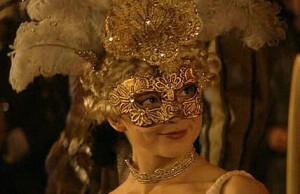 On Sunday 27th October 1532, Anne Boleyn, Marquis of Pembroke, made a dramatic entrance after the great banquet held by Henry VIII in Calais for Francis I.
On Sunday 27th October 1532, Anne Boleyn, Marquis of Pembroke, made a dramatic entrance after the great banquet held by Henry VIII in Calais for Francis I.
The chronicler Edward Hall writes of how the room was lavishly decorated with cloth of tissue, cloth of silver, gold wreaths decorated with stones and pearls, and candelabra. It also had a cupboard stacked high with gold plate. He then describes the entrance of Anne Boleyn and her masked ladies:-
“After supper came in the Marchiones of Penbroke, with. vii. ladies in Maskyng apparel, of straunge fashion, made of clothe of gold, compassed with Crimosyn Tinsell Satin, owned with Clothe of Siluer, liyng lose[loose] and knit with laces of Gold: these ladies were brought into the chamber, with foure damoselles appareled in Crimosin satlyn[satin], with Tabardes of fine Cipres[cypress lawn]: the lady Marques tooke the Frenche Kyng, and the Countes of Darby, toke the Kyng of Nauerr, and euery Lady toke a lorde, and in daunsyng[dancing] the kyng of Englande, toke awaie the ladies visers, so that there the ladies beauties were shewed.”
Wynkyn de Worde corroborates this and names the ladies accompanying Anne as Mary Carey (nee Boleyn, Anne’s sister), the Countess of Derby, Lady Fitzwater, Lady Rochford (Jane Boleyn), Lady Lisle and Lady Wallop.
The French King then spoke a while with Anne Boleyn, before being escorted by Henry VIII back to his lodgings.
Also on this day in history…
- c.1467 (night of 27th/28th) – Birth of Desiderius Erasmus, humanist, Catholic priest, classical scholar and theologian in Rotterdam. His works included Enchiridion militis Christiani, or the Handbook of the Christian Soldier (1503), The Praise of Folly (1511), Institutio principis Christiani (1516) and Sileni Alcibiadis (1515).
- Bishop Cuthbert Tunstall presided over the burning of Lutheran books, such as William Tyndale’s New Testament, at St Paul’s. He had issued an edict commanding that copies of the English New Testament should be found and delivered to him because members of Luther’s sect had “translated the new Testament into our English tongue, entermedling there with many heretical articles and erroneous opinions… seducing the simple people.”
Notes and Sources
- Hall’s Chronicle, Edward Hall, p792-793
- The Maner of the tryumphe of Caleys and Bulleyn and The noble tryumphaunt coronacyon of Quene Anne, wyfe unto the most noble kynge Henry VIII, Wynkyn de Worde, p12-13